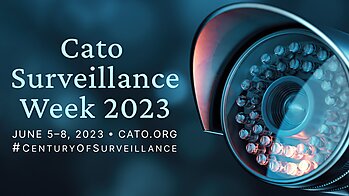Biometrics: Privacy versus Public Safety
Watch the Event

- 2x
- 1.75x
- 1.5x
- 1.25x
- 1x, selected
- 0.75x
- 0.5x
- Chapters
- descriptions off, selected
- captions settings, opens captions settings dialog
- captions off, selected
This is a modal window.
Beginning of dialog window. Escape will cancel and close the window.
End of dialog window.
This is a modal window. This modal can be closed by pressing the Escape key or activating the close button.
This is a modal window. This modal can be closed by pressing the Escape key or activating the close button.
Join the conversation on X using #CenturyofSurveillance. Follow @CatoInstitute on X to get future event updates, live streams, and videos from the Cato Institute.
Featuring



Privacy Officer, Transportation Security Administration
The explosion in the use of facial recognition and other biometric technologies by government and private-sector entities has sparked a national debate about such systems. Just over a year ago, a Pew Research Center survey of American attitudes toward artificial intelligence also asked how people felt about law enforcement use of facial recognition. Among those surveyed, 46 percent thought the use of facial recognition by law enforcement is a good idea, even though two-thirds of respondents said police “would be able to track everyone’s location at all times and that police would monitor Black and Hispanic neighborhoods much more often than other neighborhoods.”
How reliable is facial recognition? Can biases be unconsciously worked into the algorithms that make facial recognition possible? How many cases of mistaken identity have been attributed to facial recognition to date? How does the law at the federal, state, or local level impact the use of biometric technology? Is the technology advancing faster than the law and policy designed to govern its use? What is the state of the Transportation Security Administration’s facial recognition and biometrics programs for air travel? Can a person be forced to put their finger on their phone to open it for law enforcement officers absent a criminal predicate? Can private companies field facial recognition technology for the purpose of deciding who can or cannot buy a product or service, attend a concert, or even enter a building absent a safety concern? Our expert panel will tackle these and related questions.
This event is part of the 2023 Cato Surveillance Week series:
Session 1 • June 5, 2023
The Pernicious Surveillance Legacy of 9/11
Have officials in the executive branch and Congress learned anything from surveillance mistakes and overreaches?
Session 2 • June 6, 2023
Surveillance Reform Prospects
What do we actually know about the alleged effectiveness of the controversial FISA Section 702 electronic mass surveillance program?
Session 3 • June 7, 2023
Domestic Terrorism versus Constitutional Speech
Extreme political views and speech have been a feature of American political and social life virtually since the founding of the republic.
Session 4 • June 8, 2023
Biometrics: Privacy versus Public Safety
The explosion in the use of facial recognition and other biometric technologies by government and private‐sector entities has sparked a national debate about such systems.

This work is licensed under a Creative Commons Attribution-NonCommercial-ShareAlike 4.0 International License.

